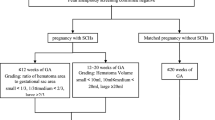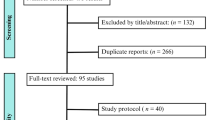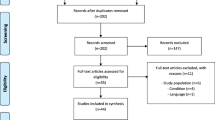Abstract
Background
The aim of this study was to evaluate hyperemesis gravidarum in pregnant women and its psychological impact.
Methods
This retrospective study included 109 pregnant females suffering from hyperemesis gravidarum admitted during 2019–2020 at Maternity Ain shams university hospital.
Results
Disease severity and laboratory investigations such as Na and K levels (P = 0.007 and < 0.001, respectively) and serum creatinine level (P < 0.001) were significantly positively correlated. Depressive symptoms included guilt feeling for leaving family (49.5% patients), suicidal thoughts (9.2%), crying (56.9%) and lost concentration (33.9%).
Conclusions
Medical staff should be aware of psychological impact of the disease and refer to specialists if needed.



Similar content being viewed by others
Data Availability
Data can be shared if required.
References
Nithiyasri P, Monika S, Leelashree T et al. Prevalance and risk factors of hyperemesis gravidarum: a retrospective study. Med Leg Update. 2020;20:132–5. https://doi.org/10.37506/mlu.v20i2.1081.
Gadsby R, Barnie-Adshead AM, Jagger C. A prospective study of nausea and vomiting during pregnancy. Br J Gen Pract. 1993;43:245–8.
Kim KO. Nausea and vomiting in pregnancy. Korean J Med. 2012;82:525. https://doi.org/10.3904/kjm.2012.82.5.525.
Brämer GR. International statistical classification of diseases and related health problems. Tenth Revis World Health Stat Q. 1988;41:32–6.
Goodwin TM, Montoro M, Mestman JH. Transient hyperthyroidism and hyperemesis gravidarum: clinical aspects. Am J Obstet Gynecol. 1992;167:648–52.
Tsakiridis I, Mamopoulos A, Athanasiadis A, et al. The management of nausea and vomiting of pregnancy: synthesis of national guidelines. Obstet Gynecol Surv. 2019;74:161–9. https://doi.org/10.1097/OGX.0000000000000654.
David M, Borde T, Siedentopf F. Do immigration and acculturation have an impact on hyperemesis gravidarum? Results of a study in Berlin/Germany. J Psychosom Obstet Gynecol. 2012;33:78–84. https://doi.org/10.3109/0167482X.2012.666594.
Matsuo K, Ushioda N, Nagamatsu M, et al. Hyperemesis gravidarum in eastern asian population. Gynecol Obstet Invest. 2007;64:213–6. https://doi.org/10.1159/000106493.
Boelig RC, Barton SJ, Saccone G, et al. Interventions for treating hyperemesis gravidarum. Cochrane Database Syst Rev. 2016. https://doi.org/10.1002/14651858.CD010607.pub2.
Austin K, Wilson K, Saha S. Hyperemesis gravidarum. Nutr Clin Pract. 2019;34:226–41. https://doi.org/10.1002/ncp.10205.
Sandven I, Abdelnoor M, Nesheim B-I, et al. Helicobacter pylori infection and hyperemesis gravidarum: a systematic review and meta-analysis of case-control studies. Acta Obstet Gynecol Scand. 2009;88:1190–200.
Gillispie V, Longo S. Hyperemesis gravidarum. Evid-Based Obstet Gynecol. 2019. https://doi.org/10.1002/9781119072980.ch22.
Ebrahimi N, Maltepe C, Bournissen FG, et al. Nausea and vomiting of pregnancy: using the 24-hour pregnancy-unique quantification of emesis (PUQE-24) scale. J Obstet Gynaecol Can. 2009;31:803–7. https://doi.org/10.1016/S1701-2163(16)34298-0.
Veenendaal M, van Abeelen A, Painter R, et al. Consequences of hyperemesis gravidarum for offspring: a systematic review and meta-analysis. BJOG An Int J Obstet Gynaecol. 2011;118:1302–13. https://doi.org/10.1111/j.1471-0528.2011.03023.x.
Maltepe C, Koren G. The management of nausea and vomiting of pregnancy and hyperemesis gravidarum–a 2013 update. J Popul Ther Clin Pharmacol. 2013;20:e184-92.
Attard CL, Kohli MA, Coleman S, et al. The burden of illness of severe nausea and vomiting of pregnancy in the United States. Am J Obstet Gynecol. 2002;186:S220-7. https://doi.org/10.1067/mob.2002.122605.
Mitchell-Jones N, Gallos I, Farren J, et al. Psychological morbidity associated with hyperemesis gravidarum: a systematic review and meta-analysis. BJOG An Int J Obstet Gynaecol. 2017;124:20–30. https://doi.org/10.1111/1471-0528.14180.
Vikanes A, Grjibovski AM, Vangen S, et al. Variations in prevalence of hyperemesis gravidarum by country of birth: a study of 900,074 pregnancies in Norway, 1967–2005. Scand J Public Health. 2008;36:135–42. https://doi.org/10.1177/1403494807085189.
Kjeldgaard HK, Eberhard-Gran M, Benth JŠ, et al. Hyperemesis gravidarum and the risk of emotional distress during and after pregnancy. Arch Womens Ment Health. 2017;20:747–56. https://doi.org/10.1007/s00737-017-0770-5.
Havnen GC, Truong MBT, Do MLH, et al. Women’s perspectives on the management and consequences of hyperemesis gravidarum–a descriptive interview study. Scand J Prim Health Care. 2019;37:30–40. https://doi.org/10.1080/02813432.2019.1569424.
Mazzota P, Magee L, Koren G. Therapeutic abortions due to severe morning sickness. Unaccept Comb Can Fam Phys. 1997;43:1055–7.
Koren G, Levichek Z. The teratogenicity of drugs for nausea and vomiting of pregnancy: perceived versus true risk. Am J Obstet Gynecol. 2002;186:S248–52. https://doi.org/10.1067/mob.2002.122601.
Shim S-M, Ryu A-L, Kim Y-S. Acute kidney injury arising from severe hyperemesis gravidarum: case report with a review of literatures. Soonchunhyang Med Sci. 2015;21:28–30. https://doi.org/10.0000/sms.2015.21.1.28.
Senturk MB, Yıldız G, Yıldız P, et al. The relationship between hyperemesis gravidarum and maternal psychiatric well-being during and after pregnancy: controlled study. J Matern Neonatal Med. 2017;30:1314–9. https://doi.org/10.1080/14767058.2016.1212331.
McCarthy FP, Khashan AS, North RA, et al. A prospective cohort study investigating associations between hyperemesis gravidarum and cognitive, behavioural and emotional well-being in pregnancy. PLoS One. 2011;6:e27678. https://doi.org/10.1371/journal.pone.0027678.
Mitchell-Jones N, Lawson K, Bobdiwala S, et al. Association between hyperemesis gravidarum and psychological symptoms, psychosocial outcomes and infant bonding: a two-point prospective case-control multicentre survey study in an inner city setting. BMJ Open. 2020;10:e039715. https://doi.org/10.1136/bmjopen-2020-039715.
Acknowledgements
The authors acknowledge the contribution of Ain Shams Hospital manager and medical students who helped us in completing our research.
Funding
No funding was received for conducting this study.
Author information
Authors and Affiliations
Contributions
Protocol design: AMA; Data collection, analysis, and manuscript writing: RGElS; Manuscript writing: RMA.
Corresponding author
Ethics declarations
Conflict of interest
The authors have no relevant financial or non-financial interests to disclose.
Ethical Approval
The study was approved by the Institutional Review Board of Ain Shams University. We also recorded the treatment received and any intervention needed, need for ICU admission and condition of patient on discharge from the medical records of the Obstetrics and Gynecology Department, Ain Shams Maternity Hospital. The research protocols used in this research were approved by the local Institutional Review Board and in accordance with the Declaration of Helsinki.
Additional information
Publisher's Note
Springer Nature remains neutral with regard to jurisdictional claims in published maps and institutional affiliations.
Rania Gamal Anwar EL-skaan (MD), Department of Obstetrics and Gynecology, Faculty of Medicine, Ain Shams University, Cairo, Egypt; Rehab Mohamed Abdel Rahman (MD),Department of Obstetrics and Gynecology, Faculty of Medicine, Ain Shams University, Cairo, Egypt; Ahmed Mohamed Abdelhamed Hassan (MD), Department of Obstetrics and Gynecology, Faculty of Medicine, Ain Shams University, Cairo, Egypt
Rights and permissions
Springer Nature or its licensor (e.g. a society or other partner) holds exclusive rights to this article under a publishing agreement with the author(s) or other rightsholder(s); author self-archiving of the accepted manuscript version of this article is solely governed by the terms of such publishing agreement and applicable law.
About this article
Cite this article
El-Skaan, R.G.A., Abdelrahman, R.M. & Hassan, A.M.A. Retrospective Analysis of Hyperemesis Gravidarum and Its Psychological Impact during Hospital Admission. J Obstet Gynecol India 73 (Suppl 1), 19–24 (2023). https://doi.org/10.1007/s13224-023-01787-3
Received:
Accepted:
Published:
Issue Date:
DOI: https://doi.org/10.1007/s13224-023-01787-3




